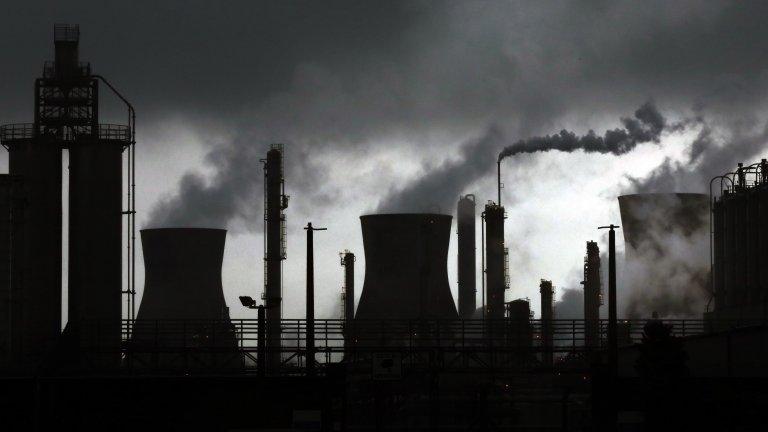Growth, insecurity and change
- Published

The Grangemouth shutdown is said to have caused an 0.2% hit to Scotland's economic growth
For most of these downturn years, the Scottish economy has behaved rather like that of the UK as a whole.
As I've noted before, Scotland may be the outlier in its geography and constitution, but it's far more like the UK average than, say, London.
The latest figures show that may be changing. If you look at both the employment and the unemployment rate, Scotland has moved into a better position on both counts than the UK average.
But if you look at the latest figures for economic growth, covering the last quarter of 2013, you find gross domestic product (GDP) has had a much worse year than the UK as a whole.
That quarter saw only 0.2% growth, while the UK was on a much healthier 0.7%. There's been a downward revision also in the second quarter of last year, cutting from 0.4% to 0.2%.
The outcome for 2013, then, is that the UK economy surprised the forecasters with growth of 2.7%, while the Scottish economy grew by 1.7%.
Grangemouth effect
The final quarter's stunted growth can be partly explained by the shut-down of the Grangemouth petro-chemical plant. It went cold for about a week, but it takes many weeks to fire it back up again. So that section of the economy - refined petroleum, chemicals and pharmaceuticals - was down 11%.
However, the statisticians say that can only explain a 0.2% hit to growth. In other words, if they're right, if there had been no Grangemouth shutdown, Scottish fourth quarter growth would have been 0.4%, and still well short of the UK growth rate.
Construction is another part of the explanation, down 1% in the final quarter. It's up over the whole of 2013, but it's been rocky and it's by only 1%, while UK construction has grown 3.4%.
So what is there to explain these figures, apart from Grangemouth? An obvious place to look is the diverging pattern within the UK economy. One big feature of the past year is the resurgence of the London and the south-east economy, most obvious in its property market.
And the gap between London and the rest of England has become a growing political issue. The coalition government and Labour are stepping up their attempts to address the regional imbalances in England.

Winnie Ewing won the Hamilton by-election against a backdrop of economic uncertainty in the UK
How does this play with the debate on Scottish independence? The 'No' side of the debate point out that the Grangemouth factor shows the higher vulnerability of a smaller economy to a single industrial plant, or sector.
But there's a bigger question, and it's a tough one to answer with any certainty: if the economy is growing again, which side benefits?
Does that make Scottish voters more confident and willing to see the opportunities of independence, whatever its risks? Or does it make them think that living standards are improving as part of the UK, life's just fine, so why bother changing?
My colleague, Colletta Smith, has been looking at this for Newsnight Scotland. Her report tonight examines the correlation between a willingness to vote for the SNP and times of economic change - whether that change is for good or bad.
By that argument, if you take the 1967 Hamilton by-election breakthrough by Winnie Ewing, that was a year of crisis in managing Britain's balance of payments, and Britain's post-war economic certainties and security was increasingly called into question.
Seven years later, the discovery of oil helped the SNP, and the 1973 OPEC oil shock had put power in the hands of the oil-rich. But there was also a deep malaise within the British economy from industrial strife and slow growth.
There is an argument, which is made by Prof Murray Pittock, a 'Yes' campaigner and a contributor to Colletta's report, that we're at an inflection point in the economy, at which growth is taking root, and therefore the nationalist case is well placed to take advantage of that.
Job security
But I'd go further, to suggest there are longer-term issues than this point of recovery, and they are common to Scotland, the UK and across Europe and the US.
The lifting of dark economic clouds is exposing a changed landscape of reduced job security, a squeeze on public spending, a big increase in self-employment and zero hours contracts, a much more mobile workforce, sharply reduced real earnings, a widened gap between high and low earners, and parents who often have little expectation that the next generation will be better off.
That economic backdrop could be a ripe opportunity to argue for change. Across the developed world, it's an opportunity for populist, opportunist, anti-Brussels or anti-government movements. In Scotland, it probably helps the case for constitutional reform.
In Scotland, whether it's 'Yes' or 'No' in September, tackling or perhaps even harnessing these economic dynamics will remain significant political challenges.
- Published16 April 2014

- Published16 April 2014
